We’ve all been there—you go to start your car, and all you hear is a clicking noise. The sound may be a single click, or it might be more of a chattering. Regardless, the result is the same: Your car’s engine doesn’t start.
What does this annoying clicking sound mean? Let’s find out.

My Car Clicks But Won’t Start—What Does it Mean?
To understand the clicking noise, you first need to know how a typical, modern starting system works. When you turn the key (or push the button) to start the engine, a control module or the ignition switch energizes the starter relay.

Electricity then flows from the battery, through the starter relay, and to the starter solenoid.
Most modern vehicles have the starter solenoid mounted directly on top of the starter. Once the solenoid is energized, it moves a plunger that forces the starter motor’s pinion gear to engage the engine’s flywheel (or flexplate).
At the same time, the plunger pushes a disc against a set of contacts, allowing the battery current to flow through the solenoid to the starter. As a result, the starter motor cranks the engine to get it going.
So what does it mean if your car clicks but won’t start? If you hear a clicking noise (but nothing else) when trying to start your car, that means the starter solenoid or relay contacts are operating, but the starter isn’t cranking the engine. The click may be a rapid chattering sound or it may just be one or two audible clicks.

Common Causes of a Car That Clicks When Trying to Start
There are two primary types of no-start conditions: no-crank-no-start and crank-no-start.
Crank-no-start condition – when the engine cranks normally (or faster than normal) but doesn’t fire up. Usually, this points to an air/fuel delivery problem, a spark delivery problem, or a lack of compression.
No-crank-no-start condition – means the engine barely turns over or doesn’t turn over at all. Typically, this points to a problem somewhere in the starting circuit.

You can learn more by reading our article: Why Won’t My Car Start.
Often, an audible clicking noise accompanies a no-crank-no-start condition. Such a scenario is usually the result of one of the following problems:
Dead Battery
A dead battery is the most common cause of a clicking noise when trying to start your car. Usually, you will hear a rapid succession of clicks. The noise indicates that the starter solenoid or relay is operating, but there isn’t enough battery current to turn the starter motor.
In some cases, if the battery is depleted enough, there won’t be sufficient electrical energy to open and close the solenoid or relay multiple times. When that happens, you’ll likely hear either just one or two clicks or nothing at all.
Faulty Starter
Although not nearly as common, a faulty starter can result in a clicking sound when attempting to start your car. Usually, you’ll hear just a single click rather than chattering. The sound means the starter solenoid is (unsuccessfully) attempting to engage the starter.
Loose or Corroded Battery Terminals or Cables
Loose or corroded battery terminals or cables can create excessive electrical resistance in the starting circuit. As a result, the starter solenoid or relay may operate, but there won’t be enough current to spin the starter.

Engine Mechanical Problem
Many people forget that an engine mechanical problem can also prevent a vehicle from starting. If the engine is seized, the starter motor solenoid or relay will close, creating an audible click. But because the engine is locked up, the starter won’t be able to turn it over to start the vehicle.
A Faulty Starter Solenoid
If the starter relay is working but the solenoid is not, you may hear the relay click—but the solenoid will not engage the starter to crank the engine.
How to Find Out What’s Causing Your No-Start & Clicking Noise Problem
Now that you’ve read the section above, you might be wondering: Is the clicking noise/no-start problem with my car due to a bad battery, a faulty starter, or something else? The only way to know for sure is to test each potential culprit—starting with the battery.
1. Check the Battery, Terminals, and Cables
When your car won’t start, and all you get is a clicking noise, the battery is usually to blame. Begin your inspection by making sure the battery terminals are clean and tight, and that the battery cables are in good condition.
Next, check the battery’s state of charge using a digital multimeter (DMM). If your battery has less than about 12 volts, you’ll want to charge it, then test it with a load tester. Most people don’t have access to a load tester, but nearly all auto parts stores do, and they’ll test your battery free of charge.

You can learn more about testing your battery in this article on how to test a battery with a multimeter.
2. Check that Power is Getting to the Starter Solenoid
Did the battery, terminals, and cables check out okay? If so, you’ll want to check whether power is getting to the solenoid on top of the starter. You can do this with an assistant and a DMM, as outlined in our article on symptoms of a bad starter.
If you hear a clicking noise, but there’s no power at the solenoid, there’s a problem with the starter control circuit. Because the clicking indicates that the relay is working, you’ll want to focus on the portion of the circuit between the relay and the starter.
On the other hand, if you’ve got power to the solenoid, but the vehicle won’t start, you may have either a bad starter or an engine mechanical problem.
3. Test the Starter
The next step is to check the starter. These days, the starter solenoid and motor usually come together as a single assembly. You can check both components by performing a starter bench test, as discussed in the same article (on bad starter symptoms) linked above.
4. Check the Engine for Mechanical Problems
At this point, you’ve checked all of the low-hanging fruit. The final step is to see whether the engine is seized. To do this, put a breaker bar on the crankshaft pulley bolt, then try to turn the engine over by hand. An engine that won’t budge is seized and has major internal mechanical problems.
Here are some helpful videos that demonstrate diagnosing a no-crank-no-start condition:
Frequently Asked Questions
Products Mentioned in this Guide
Any information provided on this Website is for informational purposes only and is not intended to replace consultation with a professional mechanic. The accuracy and timeliness of the information may change from the time of publication.


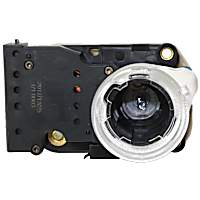 Ignition Switch
Ignition Switch
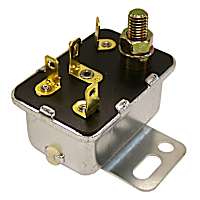 Starter Relay
Starter Relay
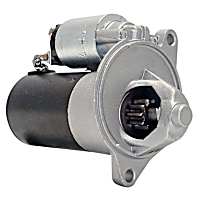 Starter
Starter
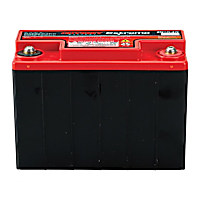 Battery
Battery

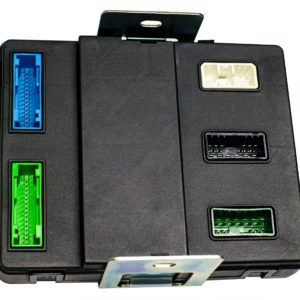


























When I turn the key to start my car it makes a clicking sound but I keep turning the key to start my car it’ll finally turn the motor and start, so why does it make that clicking noise, it makes the clicking sound only when the engine is cold
My car is a 93 corvette